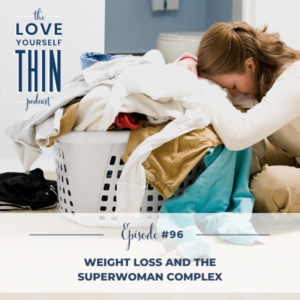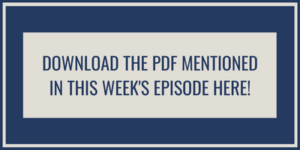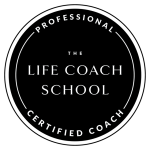 Do you swoop in and take over when there’s trouble? Work long hours and ignore signs from your body that you are exhausted? Plow through most struggles? Do you think that you need to just push a little longer and then you’ll be able to rest, but that rest never really comes? If any of these traits sound like you, this episode is for you!
Do you swoop in and take over when there’s trouble? Work long hours and ignore signs from your body that you are exhausted? Plow through most struggles? Do you think that you need to just push a little longer and then you’ll be able to rest, but that rest never really comes? If any of these traits sound like you, this episode is for you!
Today we are talking about the Superwoman complex. As women we have so many things on our to do lists and a lot of the time we take on more than we should. Striving for balance in all areas of life can contribute to long-term success with our weight loss battle. Listen in to hear how my coaching program helps you do just that.
If you are ready to lose weight and change the way you think about hunger, sign up for the lifetime access membership for Love Yourself Thin! Doors are open and you can find all the information by clicking here.
What You’ll Learn from this Episode:
Signs of the superwoman complex
To overcome going to food, we need to find balance
The four parenting styles
- Our relationships that we have with people are our thoughts about those people
Listen to the Full Episode:
Featured on the Show:
- If you are ready to lose weight and change the way you think, sign up for the lifetime access membership for Love Yourself Thin! Doors are open and you can find all the information by clicking here.
- Leave me a review in Apple
- Jody Moore: Clean Pain vs. Dirty Pain
Full Episode Transcript:
96. Weight Loss and the Superwoman Complex
Do any of these remind you of yourself? You swoop in and take over when there’s trouble. You rescue people. You work long hours and you don’t listen to your body. You’re very accomplished on the outside, but you worry so much about what others think of you. You can feel resentful. And you plow through most struggles. You think that you need to just push a little longer and then you’ll be able to rest, but that rest never really comes. These are some of the characteristics of the superwoman complex. I’m Dara Tomasson and this is Love Yourself Thin episode 96, weight Loss, and the Superwoman Complex.
Hello everyone. So I made this up. I made up the superwoman complex, maybe is a thing of some sort, but I’m gonna describe it in my own Dara way. And I want to really encourage you to think about what’s going on here and, and how much of this relates to you and how much doesn’t. Now one of the problems that I see throughout my coaching, my interactions with my clients, my own personal story and my observations of just even the people around me, is we tend to have the pendulum swing from one extreme to the other, and we have those people who are very type A personalities. They need to do things a certain way and others that are just so relaxed and they don’t get anything done. So you have the extremes, but most of us kind of fall in the middle. But I’m curious about if we are on that pendulum and why are we there and how did we get there?
So as I was thinking about this concept of being the rescuer and going in and having to fix everything and I, I wanted to share one of the reasons why this shows up in a podcast about weight loss is that when you are in this extreme, you are not balanced in your own body. You don’t have a regulated nervous system. You don’t have a lot of self-awareness. You don’t have a lot of really good coping strategies. And so when this is happening, you’re feeling kind of outta control. And so you go to these external measures, these extreme measures, as a way of coping. And these aren’t coping strategies that are helpful. They’re coping strategies that cause you to feel more stress and more challenge. And one of the things that I noticed in my membership is there are women who try to do everything for everyone, and then we have those who hardly even show up for themselves. The fact that they even signed up and they actually invested in themselves is really, really challenging. And a lot of you listening to this podcast, a lot of you want to do something for yourself and you can see that the solution really is to get into your brain and to see the root of the problem, but you have such a difficult time investing in yourself and feeling like you can change.
So I wanted to bring this episode up. I wanted to share some thoughts with you and I wanted to help you see where you are in this pendulum, why you, maybe you got to that area in the pendulum, and I wanna help you to see that you can get a way out. So in the worksheet I have a description of just the characteristics of the superwoman complex of like going in, saving the day putting herself out there. I mean, another way of looking at this too is, it is a form of people pleasing because every time you say yes to somebody, you’re actually saying no to yourself. And when you keep putting yourself, your priorities yourself out there, you are losing trust and confidence with yourself.
Now, I have this interesting example this week, so I was able to buy a house and my mom, I’ve shared about this in the podcast before. So my mom has moved upstairs and the renters, I shared about them, and everything needed to be repainted. There was a lot of holes in the walls and they’re pretty beat up and it’s a really nice house and it just needs some work, needs to be repaired and painted. So on Monday, I spent several hours filling holes, and then Tuesday, Wednesday, and Thursday I’ve been painting. And today as I’ve been working, my shoulder is so sore and I’m sitting here and doing all of this work, and I thought, Oh, and it’s actually sunny and it would be perfect painting weather. And I just thought to myself, I don’t need to be a superwoman. I don’t have to go. I can give my shoulder a rest. I don’t have to plow through this. This has been a big push getting the. renter out. And there’s just been a lot of different responsibilities and I don’t wanna fall in that trap anymore. And so it took a lot of courage for me to message my mom and say, I’m not coming tonight. I’m gonna let myself rest and I’ll be there in the morning. Now that is a huge shift for me. That is a, it’s a tricky one for me because I think a lot of those of us who tend to be on the pendulum swing of I can do things, I’m very accomplished. We are very accomplished and we can do amazing things, but we have to also be very mindful of limitations and quality of life. And we also want to make sure that we are enjoying the time that we have and we are having that kind of relationship with ourself.
So I’m gonna give some examples and I think it’s really interesting just to talk about this idea of the pendulum shift. Now, we’ve seen lots of examples in history of the pendulum. So we go from women who are subservient, they don’t have a voice. In fact, I have such an incredible memory. When I was 19, I lived in the south of France. I lived on a vineyard. And I, there was a chateau and I helped renovate the chateau. And then when the people were there, she had lots of dinner parties. So I would go and I would prepare all the food for the dinner parties and clean up after them. And I did painting and sanding and all sorts of things. And one day there was a farmer that lived in the house. It was kind of attached to the house, but not really. And so this farmer, he was in charge of the vineyard. And one night there was a problem, I can’t remember what the problem was, but I, I had to go over there and it was probably around, I don’t know, six or seven at night. And the farmer was sitting at the table and there was a gentleman that was with him, fellow farmer, I guess. And they were sitting at the table and the wife was standing. And this is in the summer of 1993, and the wife stood there and she waited for them to empty their glass and she would fill the glass. I had never seen anything like that. And she was having cancer problems and so she wasn’t well, but there she was standing there filling, waiting for them to empty their drinks so that she could fill them.
So this is what I’m talking about with the pendulum swinging of really not having a voice, being more subservient to the other extreme. And as you are seeing the theme of my podcast, in order to become permanently thin and to be able to overcome going to the food all the time. Then we need to learn how to find balance. We need to learn to feel all our feelings. We need to be able to stop blaming others and shaming ourselves. We need to start learning to trust ourselves and be able to grow our capacity to feel uncomfortable. We need to take responsibility for the food that we eat. So when you step on the scale and we understand, oh, I’m the one who puts the food in my mouth. I’m the one that’s creating this. So I’m helping you understand the importance of balance in our life.
Now I’m gonna share another story. So, when I went to university, I really struggled with my writing. And in fact, my second year of university I was diagnosed with learning disability. And it was a very unique disability where my brain went much faster than my hand could keep up with. So there was a disconnect between my brain and my hand. And so when I would write, I would miss sentences, I would miss phrases, I would miss words. Because I didn’t even notice that I was missing them because my brain was just going so quickly. And so my first semester I had a paper that was due and it was a really big struggle. At high school, I actually did really well in high school because it was a small high school. And my teachers, they just knew how smart I was. They just thought maybe I had some like test anxiety or something, but I always did well because I was so verbally succinct and so clear, and I had such good ideas in class and in presentations, they just thought maybe I’m just like nervous when it comes to writing. So I’m at university and I’m really struggling with my paper and my mom comes and she helps me and mostly does a lot of it for me, and it took a long time for me to learn how to do that on my own, and so she kind of swooped in and kind of saved me. Didn’t really show me like what I was doing was wrong or anything. So fast forward to a few weeks ago, my daughter, who is in her first year of university, same university that I went to. She sent me a paper, and this actually, this is the second time, she sent me a, the paper and I looked at it and I thought, this isn’t, totally wonderful. It’s, there’s ideas that weren’t really developed. It wasn’t a very good structure. And it was very interesting for me to watch myself decide, am I going to be the superwoman complex, who comes in, saves the day and doesn’t take the time to show her what actually is required to write a really succinct and clear paper. And so it took longer for me to work through the concepts of a paper, of planning and then of, her going to the writing center and getting that support. But she was able to really start to learn what actually you need to do, the steps you need to take to have a really good paper. And that’s what I do with weight loss.
That is what I do with figuring out why are we going to the food? Why are we not allowing ourselves to feel the emotions? Why are we numbing ourselves out with overeating or with overdosing ourselves with sugar and refined flour? And the more that we can just sit with that discomfort, just like my daughter, she sat with that discomfort of, I don’t really know how to write a paper very well. I don’t really know how to structure it very well. High school didn’t really prepare me. The more she was willing to be uncomfortable with that, the more success she’s had. And I have to say, I’m very proud of her. The first essay I think she got something like 92, and then this, this most recent one, she got 80%, which was very exciting. And the most exciting part was she wrote it. I just gave her guidance and direction.
And so of course we can see that this is the problem with diets. So when you go to keto or Jenny Craig or whatever it might be, Noom, they don’t really show you why they’re saying you should eat this food and why you should eat that food and what’s going on. And they also don’t give you the support of coping strategies when the struggles come. When your shoulder’s super sore or when your, you know, your neighbor makes a really negative comment. Or when your quilt that you submitted for a show was rejected or whatever those are. Those are emotional challenges and unless you understand how to be resilient and how to allow all those emotions, you will continuously go to the food. So no matter what the other diets are telling you, you won’t have that capacity.
And so as I’m thinking about the superwoman complex, I, I thought about parenting styles. So there are four generally four agreed upon parenting styles. There is the authoritative parent who is the one who says, I’m gonna focus on obedience and punishment over discipline. So a lot of us have taken that authoritarian style with food. We say things like, you know you should eat this, and these are the rules, and if you don’t follow them, you’re a dummy and like, we’re not gonna take your feelings into consideration. Okay? So when a authoritarian parent, they say things like, because I said so, then the child doesn’t, you never really learn how to make decisions for yourself. And the repercussions of this is you could become hostile or aggressive and so you can really fight these food choices.
Another parenting style is authoritative parent, so the authoritative parent explains the reasons behind the rules. Authoritative parent sets limits, reinforces rules and gives consequences, but takes their child’s feelings into consideration. And they also put a lot of effort into creating and maintaining a positive relationship with their child. So authoritative parents invest time and energy into preventing behavior problems before they start. They also use positive discipline strategies to reinforce positive behavior like praise and reward systems. So researchers actually have found that kids who have authoritative parents are most likely to become responsible adults. And authoritative parenting is more of the approach that I take as a life coach. I help you see what’s going on. I help you understand the reasons behind the rules. So this is the weight loss science, and you can’t fight with the science. And then I help you to understand your emotions.
Now, a permissive parent, so they do, they say things like, oh, here are the rules, but we don’t really need to enforce them, and they don’t really give any consequences very often, and they think your child will learn best with little interference from you. So the problem with a permissive parent is that kids who grow up with permissive parents are likely to struggle academically. They have low self-esteem and they have a lot of sadness.
So then the last parenting style is the uninvolved parent. So the uninvolved parent says things like, you don’t ask your child about their homework or school. They rarely know where their child is or who they’re with. They don’t understand. They don’t spend a lot of time with their child. So of course the children from uninvolved parents, they suffer from self-esteem issues and they tend to perform poorly at school and they don’t have a lot of happiness. Now, the reason I share these different parenting styles is just the whole concept of the pendulum swinging. And I want you to see yourself in this pendulum as I’m talking about going from one extreme to the other, and I want to help you to find that healthy balance and so, as you look at your relationship with food and as you look at your relationship with yourself, I want you to, on the second sheet on in the handout, I have the characteristics of the superwoman and then I have you write what is your ideal. And I want you to write down your thoughts about what got you to where you’re at. And I did bring up the parenting styles because the way that we grew up, even though it’s been a long time since we’ve left our homes with our parents, and sometimes I struggle with this, because I’m 49 years old and now my mom lives four minutes away. And there’s some different challenges that, and she brings up when she says certain things or phrases, it brings a lot of different emotion for me and I, I need to work through all of that. But the thing that I wanna remind you, and this is one of the modules in Love Yourself Thin, is that our relationships that we have with people are always our thoughts about those people. So unless we really slow down and look at what behaviors we’re having, what we’re doing, we will not be able to move forward.
I have this great quote from Joe Dispenza, and he says “Knowledge is power, but knowledge about yourself is self-empowerment.” And then I love how he said “We can’t create a new future while we’re living in our past. It’s simply impossible.” So if you want to change your relationship with food, you wanna change your relationship with your spouse or your children or your neighbors. You have to be willing to go inside your brain and do the work, and that is what I’m here for. That is what I’m here to help you with. So whether you’re the superwoman or you’re the opposite, I’m here to help you to find that balance and to help you to have a life where you feel amazing. I’m so glad that you joined me for this episode. Bye-bye.








